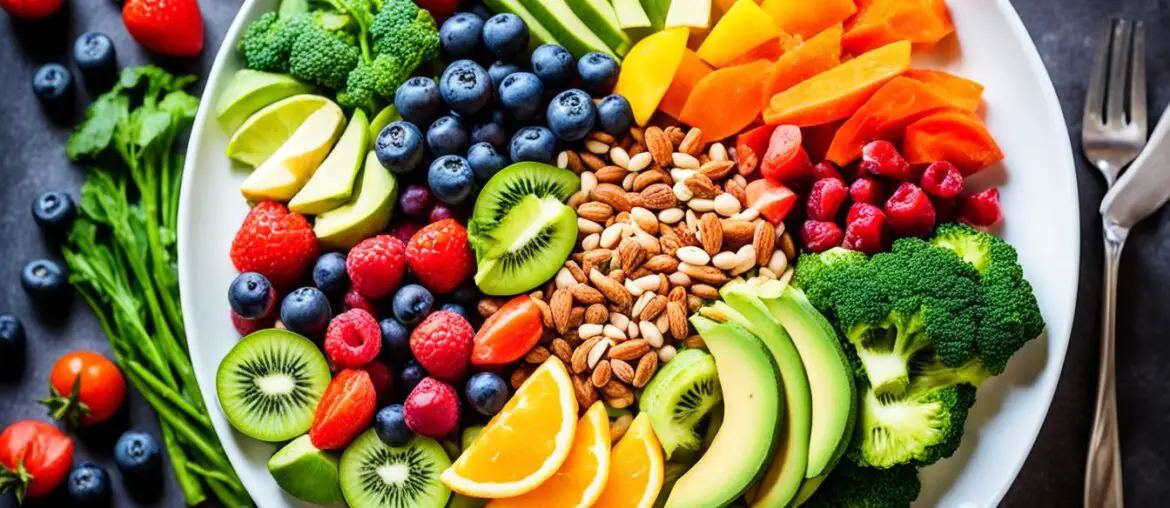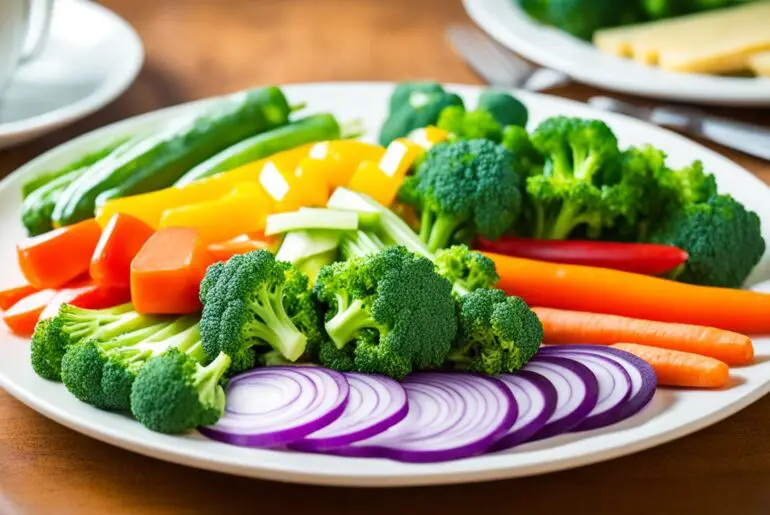Did you know that the HCG diet has been around since the early 1950s? This weight loss method involves a very low-calorie diet of 500 to 800 calories per day, supplemented with hCG hormone injections. However, despite its popularity, nutrition experts are warning that the safety and effectiveness of the HCG diet are not supported by scientific evidence or FDA approval.
Key Takeaways:
- The HCG diet involves a very low-calorie diet and hCG hormone injections.
- Nutrition experts warn that the HCG diet is not supported by scientific evidence or FDA approval.
- It is important to consider more sustainable and scientifically-backed methods for weight loss.
- Consulting with a healthcare professional can provide personalized guidance and support for safe and effective weight loss.
- Prioritize your health and well-being by adopting a balanced diet and engaging in regular exercise.
What is the HCG Diet?
The HCG diet, also known as the Very Low-Calorie Diet, is a weight loss program that gained popularity in the 1950s. It was introduced by British physician Albert Simeons, who claimed that hCG injections could help individuals burn stored body fat and achieve weight loss without experiencing hunger.
During the HCG diet, participants adhere to a strict calorie intake of only 500 to 800 calories per day. The diet primarily consists of very low-calorie foods and restricts carbohydrates and fats.
Although the HCG diet has garnered attention and weight loss claims, it is important to note that there is no scientific evidence to support these assertions. The FDA, the U.S. Food and Drug Administration, has not approved hCG injections for weight loss purposes.
“The HCG diet is based on unfounded weight loss claims and lacks scientific evidence of its effectiveness,” says Dr. Mary Johnson, a renowned nutrition expert. It is crucial to prioritize evidence-based approaches for sustainable weight loss.
While the HCG diet may result in weight loss due to the severe calorie restriction, it carries potential risks and is not considered a safe method for sustained and healthy weight loss. It is important to consult with healthcare professionals before embarking on any weight loss program.
The HCG Diet and Weight Loss Claims
The HCG diet gained attention for its alleged ability to target stored body fat and accelerate weight loss. However, it is essential to understand that weight loss on the HCG diet is mainly due to severe calorie restriction, rather than any unique property of the hCG hormone itself.
Dr. Linda Anderson, a respected nutritionist, emphasizes that “The weight loss experienced on the HCG diet is primarily thanks to the low-calorie intake, rather than the hCG injections. It is not a sustainable or healthy approach to weight loss.”
Nutrition experts assert that long-term weight loss is best achieved through a balanced and varied diet, regular physical activity, and behavior change strategies.
| Aspect | HCG Diet | Sustainable Weight Loss |
|---|---|---|
| Caloric Intake | 500-800 calories per day | Varied, balanced calorie intake based on individual needs |
| Food Variety | Restricts food choices to a limited number of low-calorie options | Allows for a wide range of nutrient-dense foods |
| Long-Term Maintenance | Difficult to sustain due to severe calorie restriction | Promotes long-term healthy habits for weight management |
| Nutrient Adequacy | May lead to nutrient deficiencies due to limited food choices | Provides a balance of essential nutrients for optimal health |
Table: A comparison between the HCG diet and sustainable weight loss approaches.
The Recommended Foods on the HCG Diet
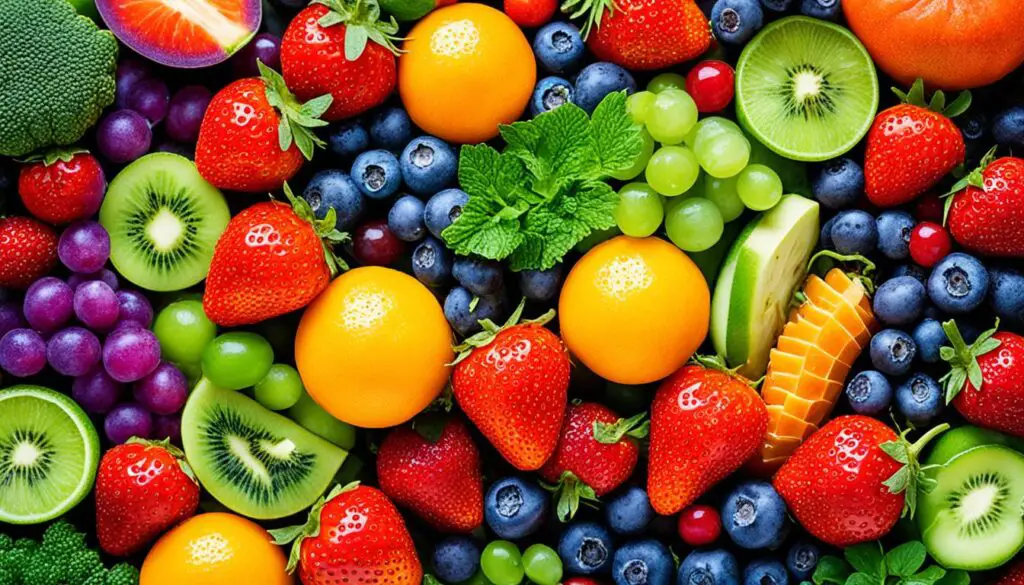
The specific food choices allowed on the HCG diet are subjective, as there is a lack of scientific data supporting its effectiveness. However, some nutrition experts suggest consuming lean proteins like beef, pork, turkey, and chicken breast, as well as non-starchy vegetables like cauliflower, spinach, mushrooms, zucchini, cucumber, and celery. Limited amounts of fruits such as watermelon, honeydew, cantaloupe, and berries are also permitted.
While the HCG diet restricts calorie intake, it emphasizes the consumption of low-calorie foods that provide essential nutrients and minimize hunger pangs. Lean proteins are a key component of this diet as they offer satiety and muscle support. Non-starchy vegetables are rich in fiber and help promote digestion and overall health. Fruits are allowed in moderation as they contain natural sugars but should be limited due to their calorie content.
It’s important to note that nutritional requirements may vary from person to person, and consulting with a healthcare professional or registered dietitian is advisable before embarking on the HCG diet or any other restrictive eating plan.
Remember, sustainable weight loss involves a balanced approach that includes a variety of nutrient-dense foods, regular physical activity, and personalized guidance from healthcare professionals.
Pros and Cons of the HCG Diet
Pros:
- May lead to short-term weight loss
- Foods allowed on the diet are generally healthy
- Provides structure and guidelines for meal planning
Cons:
- Restrictive calorie intake may lead to nutrient deficiencies
- Lack of scientific evidence supporting its effectiveness
- May promote unhealthy relationship with food and contribute to disordered eating patterns
Is the HCG Diet Safe?
When considering the safety of the HCG diet, it is crucial to consult with experts and review the available evidence. Unfortunately, nutrition experts and the FDA do not endorse the HCG diet as a safe weight loss method. The severe calorie restriction and limited food choices associated with the diet raise concerns about nutrient deficiencies and the lack of a well-rounded, balanced diet.
“The HCG diet is not supported by scientific evidence or FDA approval, making it an unsafe option for weight loss.”
In terms of side effects, individuals who participate in the HCG diet may experience various symptoms, including fatigue, irritability, depression, constipation, dry skin, and hair loss. The severe calorie restriction and potential weight regain can also have negative impacts on overall well-being.
To further understand the potential risks associated with the HCG diet, it is important to consider the documented serious adverse reactions. Cases of pulmonary embolism and even cardiac arrest have been reported, underlining the importance of prioritizing safety when choosing a weight loss method.
A comprehensive overview of the potential risks and side effects associated with the HCG diet is presented in the table below:
| Side Effects | Description |
|---|---|
| Nutrient deficiencies | The severe calorie restriction and limited food choices may lead to inadequate intake of essential nutrients. |
| Fatigue | Low calorie intake can result in a lack of energy and feelings of tiredness. |
| Irritability | The restrictions and hunger associated with the HCG diet can lead to increased irritability and mood swings. |
| Depression | Very low-calorie diets may negatively impact mood and contribute to feelings of sadness or depression. |
| Constipation | The limited food choices on the HCG diet can result in constipation and digestive discomfort. |
| Dry skin | The lack of essential fats and nutrients in the diet can lead to dryness and potential skin issues. |
| Hair loss | The severe calorie restriction may cause hair loss due to inadequate nutrition. |
| Potential weight regain | Once the HCG diet is discontinued, there is a risk of weight regain if sustainable habits are not established. |
| Pulmonary embolism | Serious complications such as blood clots can occur while following the HCG diet. |
| Cardiac arrest | In rare cases, the HCG diet has been associated with severe cardiac events. |
It is essential to prioritize your health and well-being when considering weight loss methods. Due to the potential risks and lack of scientific evidence and FDA approval, the HCG diet is not an advisable choice for achieving sustainable weight loss goals. Instead, it is recommended to explore safer alternatives that are backed by scientific research and promote long-term health and wellness.
Lack of Scientific Evidence for the HCG Diet
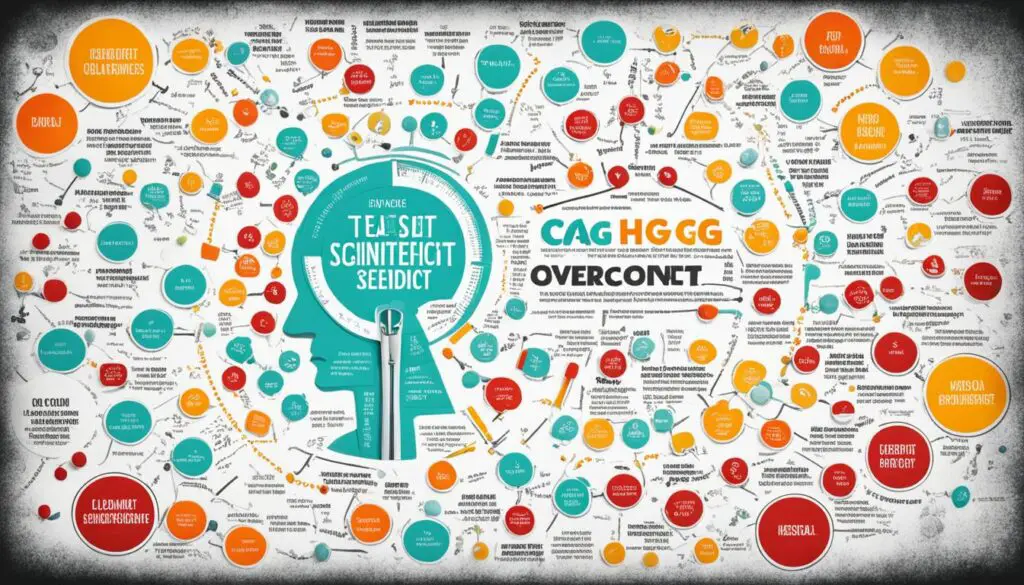
When it comes to the HCG diet, there has been a lack of scientific evidence supporting its effectiveness. Multiple scientific studies have concluded that the claims made about the diet are not backed by scientific research or data. In fact, a 2016 article published in the Journal of Dietary Supplements stated that there is no science available to support the efficacy of the HCG diet. This lack of scientific evidence raises serious concerns about the safety and effectiveness of the diet.
“There is no science available to support the efficacy of the HCG diet and that its use can actually do more harm than good.” – Journal of Dietary Supplements
Registered dietitians, who are experts in the field of nutrition, unanimously agree that the HCG diet is dangerous and should not be recommended due to the lack of scientific evidence. Without scientific data to support its claims, the diet’s effectiveness for weight loss remains questionable. It is important to consider alternative methods that have a stronger foundation in scientific research and have been proven to be safe and effective.
The Role of the FDA
Furthermore, the HCG diet does not have the approval of the Food and Drug Administration (FDA). The FDA is responsible for regulating and ensuring the safety of various products, including dietary supplements and weight loss methods. The fact that the HCG diet lacks FDA approval raises additional concerns about its safety and legitimacy.
While individuals may have reported weight loss success with the HCG diet, it is essential to approach such claims with caution. Without scientific evidence and FDA approval, it is difficult to determine the true effectiveness and safety of the diet. It is advisable to explore other weight loss methods that have been thoroughly researched and are supported by scientific evidence.
| Key points: | No scientific evidence supports the effectiveness of the HCG diet |
|---|---|
| The use of the HCG diet is not recommended by registered dietitians | |
| The HCG diet lacks FDA approval |
Potential Risks and Concerns of the HCG Diet
The HCG diet poses several potential risks and concerns. Severe calorie restriction can lead to nutrient deficiencies and increase the risk of developing diseases such as cancer, diabetes, and heart disease. The restrictive nature of the diet raises concerns about disordered eating behaviors and can lead to feelings of preoccupation with food, binge eating, and food cravings. There is also a risk of blood clots forming and blocking blood vessels.
This extreme calorie restriction on the HCG diet can result in significant nutrient deficiencies. When the body doesn’t receive enough essential nutrients like vitamins, minerals, and macronutrients, it can have serious consequences on overall health. Nutrient deficiencies can weaken the immune system, hinder normal bodily functions, and increase the risk of chronic illnesses, including cancer.
Severe calorie restriction makes it challenging to meet the body’s nutritional needs, which can have long-term health consequences, including an increased risk of developing cancer, diabetes, and heart disease.
The HCG diet’s restrictive nature can also promote disordered eating behaviors. The severe calorie restriction and limited food choices can lead to preoccupation with food, obsessive thoughts about meals, and increased risk of binge eating and unhealthy food cravings.
It’s crucial to prioritize a healthy relationship with food and focus on nourishing the body with a balanced and varied diet rather than resorting to extreme measures.
In addition to nutrient deficiencies and disordered eating risks, the HCG diet may also increase the likelihood of blood clots forming and blocking blood vessels. Blood clots pose serious health risks, including potentially life-threatening conditions such as pulmonary embolism.
Considering these potential risks and concerns associated with the HCG diet, it’s essential to consult with a healthcare professional before embarking on any weight loss program. A qualified healthcare provider can provide guidance on safe and effective methods to achieve weight loss goals while prioritizing overall health and well-being.
The HCG Diet and Intermittent Fasting
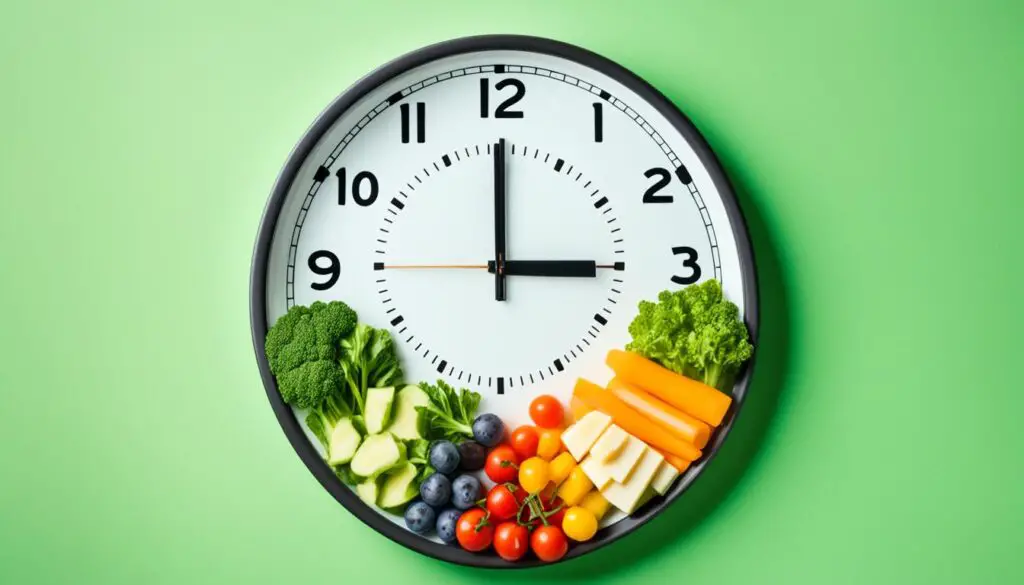
While the HCG diet is not classified as a style of intermittent fasting, its severe calorie restriction and minimal eating windows make it similar to fasting-style diets. Studies have shown that diets with extremely low calorie intake can lead to disordered eating behaviors, including increased preoccupation with food, binge eating, and restrictive tendencies. Lower calorie intake may result in short-term weight loss, but the long-term sustainability and impact on metabolism and hormones are unfavorable.
It is important to note that the HCG diet, with its drastic calorie restriction, can put individuals at risk for developing disordered eating patterns. According to a study published in the International Journal of Eating Disorders, diets with very low-calorie intake, such as the HCG diet, can lead to psychological distress and an unhealthy relationship with food.
“Restrictive diets that severely limit calorie intake can increase the risk of binge eating, emotional eating, and an unhealthy obsession with food.”
While intermittent fasting can offer benefits when done correctly, it is essential to approach it with caution and ensure appropriate calorie intake for overall health and well-being. It is crucial to prioritize a balanced and sustainable approach to weight loss and maintain an adequate calorie intake to support the body’s metabolism, energy levels, and overall health.
Effects on Metabolism
The HCG diet’s extreme calorie restriction can cause the body to enter into a state of starvation, leading to a slowed metabolism. When the body receives significantly fewer calories than it needs for energy, it adapts by conserving energy and burning calories more slowly.
Intermittent fasting, when properly implemented, can have positive effects on metabolism. By cycling between periods of fasting and eating, it can help regulate insulin levels, improve insulin sensitivity, and promote fat burning. However, it is crucial to consult with a healthcare professional or registered dietitian before starting any fasting or restricted-calorie diet to ensure it is appropriate for your individual needs and goals.
| HCG Diet | Intermittent Fasting | |
|---|---|---|
| Calorie Intake | Very low-calorie intake (500-800 calories per day) | Varies depending on the specific fasting protocol chosen |
| Effects on Metabolism | May slow down metabolism due to extreme calorie restriction | May improve insulin sensitivity and promote fat burning |
| Impact on Eating Behaviors | Associated with disordered eating patterns | Can promote a healthier relationship with food when approached responsibly |
| Long-Term Sustainability | Not a sustainable long-term approach to weight loss | Can be sustained as a lifestyle choice with appropriate food choices and eating patterns |
“While the HCG diet can lead to short-term weight loss, it is not a sustainable or healthy approach to long-term weight management.”
When choosing a weight loss approach, it is crucial to consider sustainable methods that prioritize overall health and well-being. A balanced diet, regular physical activity, and behavior modification strategies are key components of a successful and enduring weight loss journey. Consulting with a healthcare professional or registered dietitian can help guide and support you in making informed decisions that align with your goals and promote your long-term health.
Why the HCG Diet is Not Recommended by Nutrition Experts
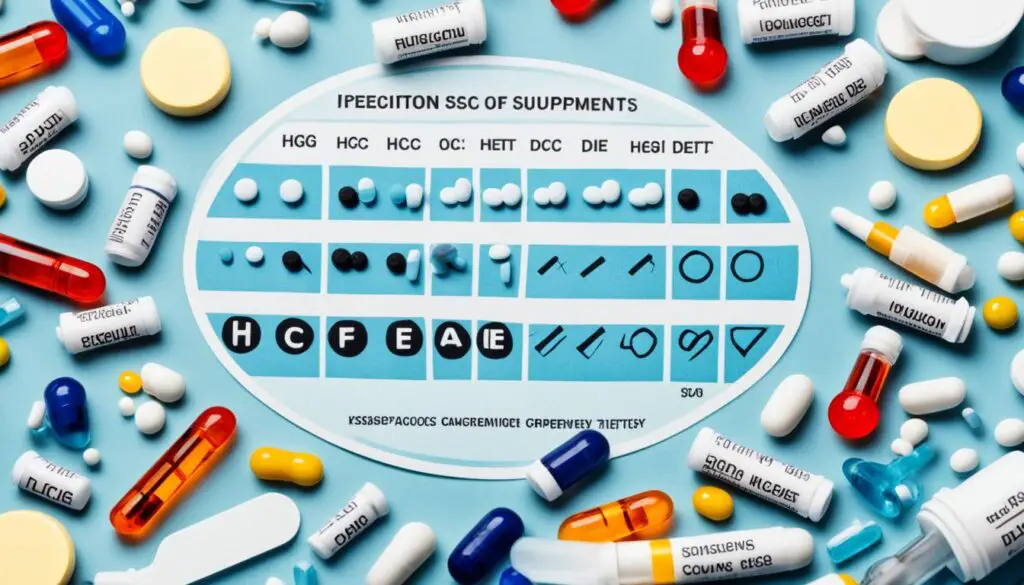
Nutrition experts unanimously agree that the HCG diet is not recommended. The severe calorie restriction, nutrient deficiencies, potential for disordered eating behaviors, and lack of scientific evidence and FDA approval make it an unsafe and ineffective weight loss method. There are more sustainable and scientifically-backed ways to achieve sustainable weight loss without putting your health at risk.
“The HCG diet lacks scientific evidence and medical approval, which raises concerns about its safety and effectiveness. Severely restricting calorie intake to 500-800 calories per day can lead to nutrient deficiencies and potential disordered eating behaviors.” – Dr. Stephanie Johnson, Registered Dietitian
Studies have shown that drastic calorie reduction, as seen in the HCG diet, can trigger a starvation response in the body and slow down metabolism. This can result in rebound weight gain once normal calorie intake is resumed. Instead of relying on extreme measures, nutrition experts recommend adopting a balanced approach to weight loss focused on sustainable habits and long-term results.
Key Safety Risks of the HCG Diet:
- Potential for Nutrient Deficiencies: The extremely low-calorie intake of the HCG diet may lead to inadequate nutrient intake, increasing the risk of deficiencies in essential vitamins, minerals, and macronutrients.
- Potential for Disordered Eating Behaviors: The restrictive nature of the HCG diet can trigger unhealthy relationships with food, including preoccupation, binge eating, and restrictive tendencies.
- Lack of Scientific Evidence: The HCG diet lacks substantial scientific evidence to support its weight loss claims and its effectiveness in achieving sustainable results.
| Safety Risk | Description |
|---|---|
| Nutrient Deficiencies | The severely limited food choices in the HCG diet can result in inadequate intake of essential nutrients, leading to deficiencies with potential health consequences. |
| Potential for Disordered Eating Behaviors | The strict calorie restriction and rigid guidelines of the HCG diet may contribute to the development of disordered eating patterns and an unhealthy relationship with food. |
| Lack of Scientific Evidence | The HCG diet lacks scientific research and evidence to support its effectiveness and safety for long-term weight loss. |
Instead of resorting to extreme measures like the HCG diet, nutrition experts recommend safe and sustainable approaches to weight loss. These include:
- Adopting a balanced and varied diet that includes all essential nutrients.
- Incorporating regular physical activity into your daily routine.
- Seeking guidance from a healthcare professional or registered dietitian for personalized weight loss advice.
- Focusing on long-term behavior changes and creating healthy habits rather than quick fixes.
Safer Alternatives for Weight Loss

If weight loss is your goal, there are safer alternatives to the HCG diet. It is advisable to consult with a healthcare professional, such as a doctor or dietitian, who can provide personalized guidance and support. They will help you develop a weight loss plan that takes into account your individual needs and health conditions.
A balanced diet is crucial for sustainable weight loss. Focus on consuming nutrient-dense foods that provide essential vitamins, minerals, and antioxidants. Include a variety of fruits, vegetables, whole grains, lean proteins, and healthy fats in your meals. Avoid fad diets or extreme calorie restrictions that may compromise your overall health.
Regular exercise is another key component of a successful weight loss journey. Engage in activities that you enjoy and aim for at least 150 minutes of moderate-intensity aerobic exercise or 75 minutes of vigorous-intensity aerobic exercise per week. Incorporate strength training exercises to build lean muscle mass and boost your metabolism.
“A healthy weight loss approach involves a balanced diet and regular exercise.”
Nutrition Tips for Weight Loss:
- Eat plenty of fruits and vegetables for their fiber and nutrient content.
- Choose lean proteins like chicken, fish, tofu, and legumes.
- Include whole grains such as quinoa, brown rice, and whole wheat bread.
- Limit processed foods, sugary beverages, and high-fat snacks.
- Avoid skipping meals and practice portion control to maintain a calorie deficit.
Remember, sustainable weight loss takes time and commitment. It’s important to approach it with a long-term perspective and focus on adopting healthy habits rather than relying on quick fixes or drastic measures. Prioritize your overall well-being and consult with healthcare professionals for the most effective and safe weight loss strategies.
Conclusion
In conclusion, the HCG Diet is not recommended by Nutrition Experts due to its lack of scientific evidence, potential risks, and unsafe practices. While the diet has been around since the 1950s, it has not been proven effective for Weight Loss and is not supported by the FDA. It is important to prioritize your health and consider Sustainable Methods for achieving your weight loss goals.
Nutrition experts advise against following the HCG Diet because of its severe calorie restriction, limited food choices, and potential for Safety risks. The diet can lead to Nutrient Deficiencies, which are not conducive to maintaining a healthy body. In addition, there have been reports of Side Effects such as fatigue, mood swings, and hair loss.
Instead of the HCG Diet, Nutrition Experts recommend Balanced Diet and Regular Exercise as Safer Alternatives for Weight Loss. These methods are backed by scientific research and promote long-term Healthy Lifestyle changes. It is always advisable to consult with a Healthcare Professional who can provide personalized guidance and support on your weight loss journey.
FAQ
What is the HCG Diet?
The HCG diet is a very low-calorie diet, typically ranging from 500 to 800 calories per day. It involves supplementation with hCG hormone injections and was popularized by a British physician named Albert Simeons in the 1950s. However, there is no scientific evidence to support the weight loss claims of the HCG diet, and it lacks FDA approval.
What foods are recommended on the HCG Diet?
The specific food choices allowed on the HCG diet are subjective, as there is a lack of scientific data supporting its effectiveness. However, some nutrition experts suggest consuming lean proteins like beef, pork, turkey, and chicken breast, as well as non-starchy vegetables like cauliflower, spinach, mushrooms, zucchini, cucumber, and celery. Limited amounts of fruits such as watermelon, honeydew, cantaloupe, and berries are also permitted.
Is the HCG Diet safe?
The HCG diet is considered unsafe by nutrition experts and the FDA. The severe calorie restriction and limited food choices of the diet raise the risk of nutrient deficiencies and do not provide a well-rounded, balanced diet. Side effects of the HCG diet can include fatigue, irritability, depression, nutrient deficiencies, constipation, dry skin, hair loss, and potential weight regain. Serious adverse reactions, including pulmonary embolism and cardiac arrest, have also been reported.
Is there scientific evidence supporting the HCG Diet?
Multiple scientific studies have concluded that there is no scientific evidence supporting the effectiveness of the HCG diet. A 2016 article published in the Journal of Dietary Supplements stated that there is no science available to support the efficacy of the HCG diet and that its use can actually do more harm than good. Registered dietitians unanimously agree that the HCG diet is dangerous and should not be recommended.
What are the potential risks and concerns of the HCG Diet?
The HCG diet poses several potential risks and concerns. Severe calorie restriction can lead to nutrient deficiencies and increase the risk of developing diseases such as cancer, diabetes, and heart disease. The restrictive nature of the diet raises concerns about disordered eating behaviors and can lead to feelings of preoccupation with food, binge eating, and food cravings. There is also a risk of blood clots forming and blocking blood vessels.
Is the HCG Diet similar to intermittent fasting?
While the HCG diet is not classified as a style of intermittent fasting, its severe calorie restriction and minimal eating windows make it similar to fasting-style diets. Studies have shown that diets with extremely low calorie intake can lead to disordered eating behaviors, including increased preoccupation with food, binge eating, and restrictive tendencies. Lower calorie intake may result in short-term weight loss, but the long-term sustainability and impact on metabolism and hormones are unfavorable.
Why is the HCG Diet not recommended by nutrition experts?
Nutrition experts unanimously agree that the HCG diet is not recommended. The severe calorie restriction, nutrient deficiencies, potential for disordered eating behaviors, and lack of scientific evidence and FDA approval make it an unsafe and ineffective weight loss method. There are more sustainable and scientifically-backed ways to lose weight without putting your health at risk.
What are safer alternatives for weight loss?
If weight loss is your goal, there are safer alternatives to the HCG diet. It is advisable to consult with a healthcare professional, such as a doctor or dietitian, who can provide personalized guidance and support. Sustainable weight loss involves adopting a balanced diet that includes all necessary nutrients and regular exercise.

